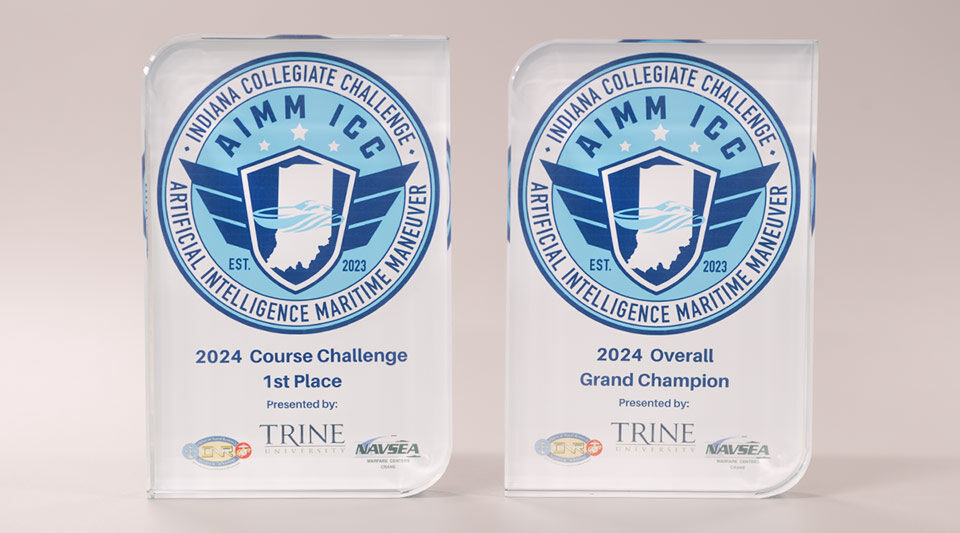A team of seven Notre Dame Engineering students clinched the 2024 Overall Grand Champions title and took first place in the Course Challenge at the inaugural Artificial Intelligence Maritime Maneuver Indiana Collegiate Challenge (AIMM ICC).
The event, a collaboration between Trine University and Crane NSWC, took place at Pokagon State Park in Angola, Indiana, April 26-28.
Teams from six Indiana universities used artificial intelligence to pilot a low-profile vessel (LPV). LPVs evade radar detection by staying close to the water’s surface, making them ideal for carrying out law enforcement and security missions requiring stealth and maneuverability.

AIMM team members were aerospace and mechanical engineering majors: juniors Aidan Francfort, Rebecca Gilpatric, and sophomores Steven Vanden Noven, and Felipe Pinho Muller; and computer science and engineering majors: sophomores Ryan Paillet, Allen Uy, and Manny Hamer.
Teams were given one hour to complete a series of missions, including slaloming between red and green buoys, retrieving an infant-sized mannequin, deploying and communicating with a sensor, and delivering an object to land—a challenge the Notre Dame team met by flying a drone from the LPV.
High winds and rough water on April 27 made conditions less than ideal for the precise maneuvering of a 300-pound, remotely controlled boat, especially one loaded with 1000 pounds of sand—necessary to maintain the boat’s low profile—plus a cargo of delicate electronics.
“The boat rocked like crazy against 30-mph winds,” said Paillet, the team’s project lead. “But it dealt with all the abuse quite handily and powered through the waves, which sometimes splashed over the entire vessel.”
Unlike traditional remote-controlled vehicles, the team’s LPV was capable of navigating autonomously, while retaining the option of manual controls when needed. The team engineered the systems that transferred power and data throughout the boat and also programmed the custom AI vision models to detect buoys, color-coded rings—even people.


“I think the team succeeded because we made continuous refinements to designs that were simple yet effective,” said Gilpatric. “I feel like all the time we spent on our boat was completely worthwhile, and the team’s small size made it possible for me to make major contributions.”
Next year, the team plans to further develop the LPV and drone’s autonomous capabilities to make them operational even in rough conditions, said the team’s advisor Enes Aydin, Learning Center Manager at Notre Dame’s Engineering Innovation Hub.
— Karla Cruise, Notre Dame Engineering
